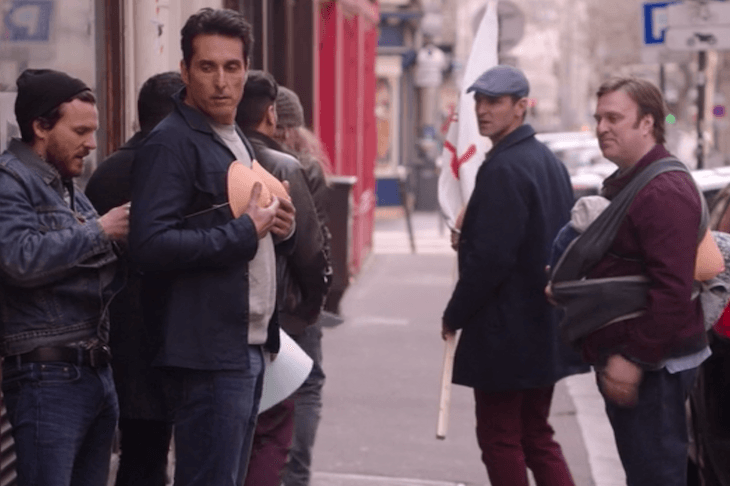You know the feeling. One minute, you’re an oversexed adman, strolling the streets of Paris and propositioning every woman you pass. The next, you’ve walked into a lamp post, and knocked yourself unconscious. You wake up in the same Paris, but now the sex roles are reversed, and the hierarchies of power and values too. Every day is now Freaky Friday in the sex wars. Is it a dream, or a nightmare?
A nightmare for forty year-old Damien, whose headlong encounter with a piece of Belle Époque street furniture begins Eléonore Pourriat’s I Am Not an Easy Man (Je ne suis pas un homme facile), a new Netflix film. Not much better for the other men, either, who are wolf-whistled even when they’re holding the baby. But for Alexandra (Marie-Sophie Ferdane), everything becomes easier.
Before the Great Reversal, Alexandra is a successful author, hit on by Damien (Vincent Elbaz) in a bookshop. After their gender reassignments, she hits on him, and him, and him, juggling men and laughing it off when one of her lovers, in a fit of male irrationality, smashes up her apartment. Before, Damien was one of the smirkers at the agency, telling the only female executive to see the joke when the team consider an app which measures a man’s success at seduction by the Pinocchio-style extension of an avatar’s cartoon erection. After, Damien’s female boss Sybille (Blanche Gardin) has a tray of tampons on her desk: ‘I’m a heavy bleeder.’ Unzipping her flies, she offers him a humiliating shortcut up the ladder of promotion.
Damien agrees to a date—his career is at stake—and finds himself in a bar with male strippers. The girls at the office have played a harmless joke on Sybille, and Damien feels forced to laugh along. Afterwards, he feels obliged to invite her upstairs to his apartment. They have a brief fumble, but Sybille, disgusted by Damien’s unshaven chest, refuses to consummate.
His friend Christophe (Pierre Bénézit) offers emotional support, and helps him through agonies of depilation. Sybille allows herself to take Damien to bed, and falls asleep as soon as she is satisfied. Damien gets a new suit for work, with tight-fitting shorts and a high-waisted jacket to showcase his buttocks, and is hassled constantly on the street by lecherous women. Falling in love with Alexandra on her terms, he is driven around in a sports car, then messed around and driven to crying on his couch. He joins a consciousness-raising ‘masculist’ group, a monstrous regiment of men who wear fake breasts in public and call women’s men ‘lickers’, but the women’s presumption to power remains unshakeable.
Pierre Bénézit and Céline Menville, who play Damien best friend Christophe and Christophe’s wife Lolo, appeared in Pourriat’s short film of 2014, Oppressed Majority (Majorité Opprimée), as a man sexually assaulted at knife-point by a female street gang, and the unsupportive police officer who takes his statement, then asks a male ‘cutie’ to bring her coffee. In Oppressed Majority, the Muslim man working at the Paternelle (day-care) has shaved his mustache and sideburns and donned a hijab because his wife prefers him that way. Women jog topless because it’s hot, and pee in the street because they can. When Pierre (Pierre Bénézit) cycles to work and waits a a traffic light, a female beggar turns nasty when he doesn’t respond to her catcalls: ‘You think I don’t see you, shaking your ass in my face, with your nice little blue Bermudas?’
Pourrait and her co-writer Ariane Fert keep the dark comedy going throughout I Am Not an Easy Man. The premise is so reasonable, and the revelations of the satire so unreasonable, that there is little sense of a conceit over-extended in the transition from short film to full-length feature. Satire is laughter, and laughter is violent in origin and expression. The women use laughter to disarm male assertions. The male victims laugh at their female persecutor’s jokes, and weaken their own resistance by complicity. The audience laughs with increasingly uncomfortable recognition at the violence that is always threatened, and often manifest.
In the end, a heartbroken Damien gets drunk on his own in a bar, and is sexually assaulted by three women. This time, both Damien and Alexandra are concussed. He awakes to find the world is back to normal. She finds herself in the nightmare, amid the sex shops of Pigalle and the chorus of advertising images, as male bystanders mock a small women’s march. She looks for Damien, he calls to her from the crowd, but it is not clear whether they can communicate over the cannonades of the battle of the sexes, let alone meet as equals; only in the hiatus of a hotel room, sharing their love of motor sport, were they are able to unite as individuals. There is nothing facile in Pourriat’s film, and less that is easy. Masculists of all ages should see I Am Not an Easy Man.
Dominic Green is Culture Editor of Spectator USA.


















